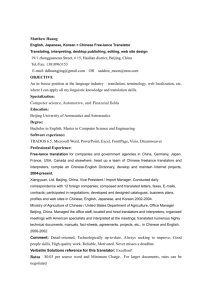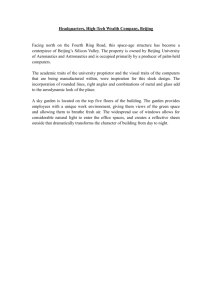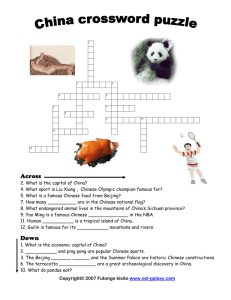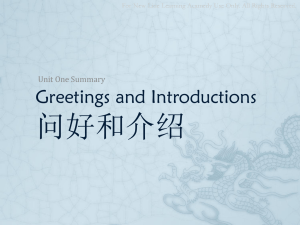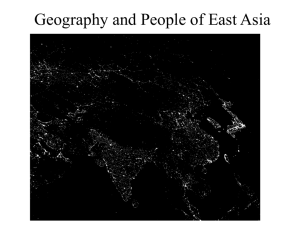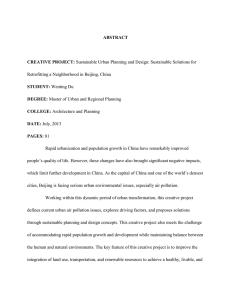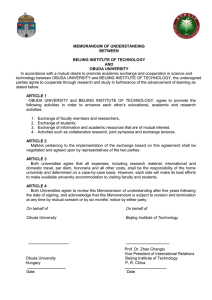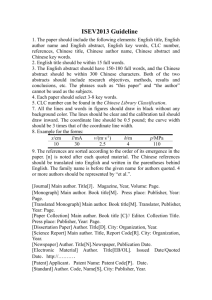SCRUTINY Letter from Beijing
advertisement
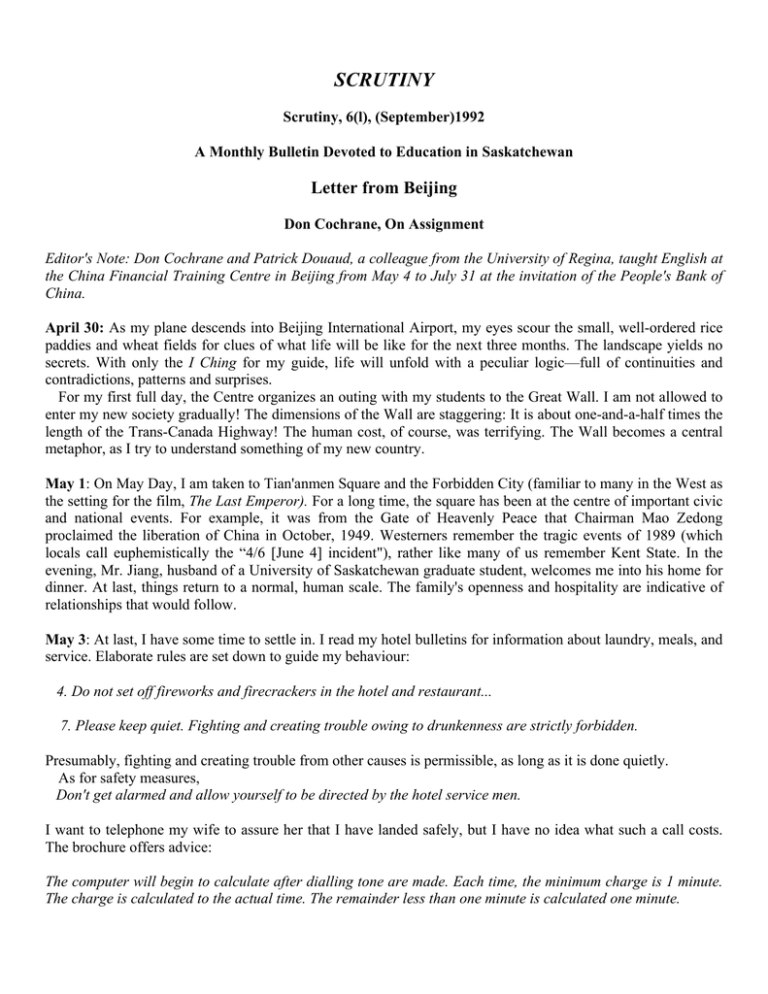
SCRUTINY Scrutiny, 6(l), (September)1992 A Monthly Bulletin Devoted to Education in Saskatchewan Letter from Beijing Don Cochrane, On Assignment Editor's Note: Don Cochrane and Patrick Douaud, a colleague from the University of Regina, taught English at the China Financial Training Centre in Beijing from May 4 to July 31 at the invitation of the People's Bank of China. April 30: As my plane descends into Beijing International Airport, my eyes scour the small, well-ordered rice paddies and wheat fields for clues of what life will be like for the next three months. The landscape yields no secrets. With only the I Ching for my guide, life will unfold with a peculiar logic—full of continuities and contradictions, patterns and surprises. For my first full day, the Centre organizes an outing with my students to the Great Wall. I am not allowed to enter my new society gradually! The dimensions of the Wall are staggering: It is about one-and-a-half times the length of the Trans-Canada Highway! The human cost, of course, was terrifying. The Wall becomes a central metaphor, as I try to understand something of my new country. May 1: On May Day, I am taken to Tian'anmen Square and the Forbidden City (familiar to many in the West as the setting for the film, The Last Emperor). For a long time, the square has been at the centre of important civic and national events. For example, it was from the Gate of Heavenly Peace that Chairman Mao Zedong proclaimed the liberation of China in October, 1949. Westerners remember the tragic events of 1989 (which locals call euphemistically the “4/6 [June 4] incident"), rather like many of us remember Kent State. In the evening, Mr. Jiang, husband of a University of Saskatchewan graduate student, welcomes me into his home for dinner. At last, things return to a normal, human scale. The family's openness and hospitality are indicative of relationships that would follow. May 3: At last, I have some time to settle in. I read my hotel bulletins for information about laundry, meals, and service. Elaborate rules are set down to guide my behaviour: 4. Do not set off fireworks and firecrackers in the hotel and restaurant... 7. Please keep quiet. Fighting and creating trouble owing to drunkenness are strictly forbidden. Presumably, fighting and creating trouble from other causes is permissible, as long as it is done quietly. As for safety measures, Don't get alarmed and allow yourself to be directed by the hotel service men. I want to telephone my wife to assure her that I have landed safely, but I have no idea what such a call costs. The brochure offers advice: The computer will begin to calculate after dialling tone are made. Each time, the minimum charge is 1 minute. The charge is calculated to the actual time. The remainder less than one minute is calculated one minute. In the hotel lobby just at the point where you pass the security guard, you are confronted with a sign engraved in brass: "Please Show Your Centificals." I feel I am being asked to remove an article of clothing, but I don't know which one. There is need here for the trade I ply. May 4: Teaching begins. Patrick and I each have classes of about twenty. Because he knows some Mandarin, we decide that he should take the less-advanced group. Our students applaud as we enter our classrooms; at last, their "foreign experts" have arrived! Although most of them are in their mid-30s and occupy senior positions in the bank throughout China, they exude an engaging zest and freshness. It is clear that they will be extraordinarily hard working. I fall in love with them immediately. Tea has been prepared for me, and students refresh my cup at each break. Throughout the summer, I will not be allowed to erase a blackboard. Should I inadvertently pick up the brush, a bank president will jump up, take it from my hand, and say cheerily, “I'll do that for you." When Patrick and I meet for dinner and compare experiences, we agree that we are about to embark on the most fulfilling teaching experience of our lives. This will be the apex. We also foresee that it will be wrenching when it is time to leave. May 9: I set my students an essay topic: "Why are there so few women in this class?" (five out of twenty-one.) Their answers are very similar to those my students at home might write. They explain sexist practices by referring to the edicts of Confucius, just as our students might place some responsibility on the heads of Aristotle and Aquinas (if they knew anything about these ancient thinkers). Several students draw on biological arguments to justify discriminatory hiring and promotion practices: "Women are physiologically different; therefore. . ." Not surprisingly, what follows the "therefore" is weak. Now I understand why Simone de Beauvoir spent so much time in The Second Sex refuting arguments derived from biology. They are deeply ingrained and found around the world. May 12: A copy of the China Daily, China's only English newspaper, is delivered to each student every day. Today, we read an article in which the government reports on the number who are HIV-Positive or have AIDS in the country. They strike me as unusually low, and I ask my students whether they find the figures credible. They are a little uncomfortable, but in general they try to defend the estimates. I tell them I am skeptical. This evening, I write a letter to the China Daily: Dear Editor, In your May 12 issue, you reported without question the government's claim that there are only 492 cases of those who are HIV-Positive and eight cases of persons with AIDS in all of China. Who's kidding who? Yours sincerely, Don Cochrane For many days, we will watch the Letters-to-the-Editor column in vain. May 29: Today, China Daily carries a story with the headline: "Mulroney faces May 31 deadline on Quebec." It is my first news from Canada, and I could have done without it. Suddenly, the ghosts of Don Getty, Gary Filmon, and the ever-imaginative Joe Clark pass before my eyes. From conferences past, I hear the voices of other constitutional giants—Brian Peckford, Bill Vander Zalm, and Grant Devine. It all seems very strange from here. But the China Daily is a regular part of our class discussions, and my students are interested. I must teach them some new vocabulary: cultural identity, special status, native rights, provincial powers, referendum, and so on. They understand the new vocabulary and the political problems, but they do not understand the hearts and minds of Canadians. Neither do 1. For solace, I turn to traditional Chinese landscape painting. For sustenance, my students return to the warmth and stability of their families. We will meet again on Monday. May 31: My students have made great progress in vocabulary, spelling, dictation, speaking, and oral comprehension this month. I provided remedial sessions for slower students. Our "victories" in these extra classes seem so small when we relate them to others, but they are gigantic in the students' experience. For example, early in May, I noted that Mr. Xu pronounced "million" as if it were "minion." We worked hard for three days, and finally, he pronounced it successfully. His classmate, Mr. Li (Lee), is no longer Mr. "Nee”; Ms. Liu is no longer Ms. "New." After thirty-five years without an "l" sound, he is understandably pleased with his breakthrough. More dramatic was Mr. Che's case: He could only utter a "sh" for a clean "s." I was stunned one day when he asked another student where she would like to "Sit " Instantly, I was a speech pathologist with a mission. Four days later, we were successful. By arrangement, I asked him to share a sentence with the class. He agreed, and after spelling and dictation the next day, he recited "Silly Sally says she is simply sorry about her sister Sandy." His pronunciation was flawless, and his performance greeted by shouts of " Hao! Hao! " (Good! Good!) and applause from his classmates. They knew what he had achieved, and they were genuinely happy for him. However, I cannot break one of my students' habits, despite patience and persistence: They insist on writing about "learnings," "understandings," and "knowledges." Clearly, Saskatchewan curriculum jargon has pierced the Bamboo Curtain. We must be "on the cutting edge," for we have exported our neologisms to the Pacific Rim. June 4: Everyone knows the significance of today, but no one will talk about it. Smack in the centre of the national news page of the China Daily is an article entitled "Democratic parties thrive in Jiangsu." I designate small groups of students as "experts" on different sections of the paper, but no one will ask questions about this article. The report claims that members of non-communist organizations "have played an increasingly important role in both the political and economic sectors." The article is highly laudatory. At the end of class, I draw aside a student who is a journalist and observe that there were no questions about this article. He smiles: "No one could talk about this article." "June 4?" I ask. "Of course," he replies. Political protest is subtle in China. It has to be. June 8: On the national news page, the lead story tells of a bizarre job market: a military museum in Beijing is being opened for a rare public recruitment competition. People swarm the armoury in search of jobs; only a few are open to women. When I question students, I find their discussion curious. It is as if there is a certain impropriety in questioning authority. This is a survival reflex. Several students construct flimsy defenses: "Perhaps this is what the authorities have in mind... Maybe this is what they mean." Perhaps. As a foreigner, I have the luxury of mild protest. I write another letter: Dear Editor, On June 8, under the headline "Loud Knocking on Front Door," you reported that more than 10,000 Beijingers had crowded into the Military Museum to apply for 180 municipal positions. Later, you indicated 80 percent (144) of the jobs were reserved for men. This fact alone provides prima facie evidence of job discrimination based on gender. If we assume both men and women were entitled to apply for the remaining 36 positions and that men will secure half of them (probably a gross underestimation), women will garner only 18 positions. If this is the front door to professional opportunity, it seems it is all but closed to women. If this situation is repeated next year, can we expect your reporters—imbued with the spirit and intent of the new Women's Rights and Protections of Interests Law—will examine fearlessly all exclusionary job descriptions and expose, where they exist, all instances of discriminatory practices. Yours sincerely, Don Cochrane The wait begins but with little optimism. Hardhitting letters do appear which advise the Chinese on where they should dispose of their chewing gum, complain about public buses not stopping at official stops, and by an Australian who congratulates China on its enlightened progress. After a month, my letter is published. My students greet me with "Hao! Hao!" My stock rises. June 15: A bulky packet arrives in the mail just before class is to begin, and I tear it open with undignified haste. My students wonder if I am homesick. My face turns ashen as I read the headlines "Martensville nightmare—7 police officers linked to horrifying child assault case" and "Keep accused in jail: Crown—More charges pending." My students see that I am stunned and express their concern in a way that requires me to explain what I have been reading. More than 170 charges have been laid against adults responsible for a daycare. We must learn vocabulary that I hope they never need to use: "sexual assault," "sexual touching," "illegal confinement," "aggravated assault," anal intercourse," and "smirking" (as in "Travis Sterling . . . stood grinning and smirking in the docket while his lawyers attempted to arrange a quick bail hearing.") They ask me if exploiting children by those in positions of trust is common in Canada. I have to admit that it is all too common. They fail to understand our culture. Who can blame them? June 18: I receive more news clippings from home, among them one datelined "Beijing—June 8" reporting that a store owner in the northern province of Liaoning had settled an argument by pulling out a double-barrel shotgun and shooting twelve customers dead. I ask my students if they have seen the report in their media (it had certainly not appeared in the China Daily, nor on the Beijing television English news service); the answer is no. When I ask them if they find it strange that this event is not public knowledge, they acknowledge that it is. Here we receive all the news that the Party deems fit to print. June 19: Professor Nie from Beijing Normal University has arranged a visit to a "key" middle school (similar to a lycee in France or a gymnasium in Germany). To enter, students must have 195/200 on their entrance examinations in mathematics and Chinese language and literature. We are granted an interview with the principal in which we learn that the school has 1,255 students, 100 teachers, and a total staff of 200. An average class size is 50. We ask him if that ratio results in discipline problems in the classroom. He appears not to understand our question. Our question reveals more about our culture than his. We point out the irony that in a country with such a strong socialist experience there should be elite schools, whereas in capitalist North America, with its promotion of privilege, the public high school is the norm. His answer is simply pragmatic: After the Cultural Revolution, the need for talent was so great that there was no choice but to create special schools for the gifted few. On some matters, pure ideology does not triumph. We visit a grade-ten English class taught under a banner which reads "Study, Unity, Progress." When the teacher enters, she greets her students with "Good afternoon, class." They reply in unison and with considerable conviction, "Good afternoon, teacher." For a "motivational set" (in our lingo), the teacher plays the Carpenters' "Yesterday, Once More," and fifty voices sing along as best they can. I look for attempts by any students to undermine the exercise by singing raucously or deliberately off-key. It never happens. My Western assumptions are showing. The teacher's pedagogy is old-fashioned. The students are instructed to turn to page 279, where they are assigned one phrase and asked to make a sentence out of it. She moves up and down the rows mechanically dishing out "to take defeat lying down," "keep busy doing something," "to have more of it," "in half" and "into halves," and "it was not long before," and so on. The teacher concentrates her attention on the student to whom she asks the question, paying no attention to others. She does not have to; they are all straining to get the right answer. I realize that our teaching methods rest on very different beliefs about student attention, desire to learn, and behaviour. Before and after class, we have the opportunity to talk with students around us. Stereotypes about rote learning are quickly banished. They have an ease of comprehension, a fluency of diction, and clarity of pronunciation that are enviable. After our visit, we have tea with Professor Nie at her favorite local restaurant. Near the end of our conversation, I ask her whether the school had been affected by the Cultural Revolution. "The school was closed. The principal was taken by Red Guards, beaten, and killed on the school grounds," she replies matter-of-factly. July 4: Six months ago, we accepted a graduate student from Beijing into our Department of Educational Foundations. Her marks were very high and her reference letters, glowing. One letter was from the head of the philosophy department at the renowned Beijing University. Once I had accepted the invitation to teach in China, I wrote to the student and her professor hoping to meet both while in Beijing. For some reason, the student has not contacted me, but today I have a meeting with Professor Zhu, head of the philosophy department. When we meet, I compliment him on what a fine student he has and how much I am looking forward to learning about her thesis on the "concept of human nature." I explain that, in the West, that notion is most problematic. He looks puzzled and then, through our interpreter, informs me that he has never had such a student, nor has he supervised a thesis on that topic! Perhaps he has forgotten, I think, and I try to jog his memory with details I remember from his letter of recommendation. But this is to no avail. As we part, we arrange to meet at the same time next week when—through the miracle of the FAX—I will have copies of all the letters of recommendation and the student's transcripts. July 11: We meet again. Professor Zhu takes one look at his alleged signature and denies that it is his. "To start with," he explains, "whenever I sign my name in Roman characters, I always add my name in Chinese characters. There is no Chinese signature here." He then locates a file with the student's name, and we check the official record. She had been a student in the department but only in the extension program. We note her grades. I am particularly interested in what she received in "Ethics": on the department's record, she was awarded 84; on my altered version, she is credited with 92! We realize that we have a case of forgery and document tampering. Professor Zhu and I are both embarrassed. I contact the student by telephone (she was employed by the university in a department where she had access to her own documents), then my department and the College of Graduate Studies, and finally the visa office of the Canadian Embassy. It is unpleasant business. When I return to Canada, there will be a letter of apology from the student waiting for me. Mixed up with political events of 1989, she was desperate to leave China—too desperate, it seems. The irony is that her real grades would have been sufficient for acceptance into our department. I wonder and worry about where she is today. July 23 and 24: It is exam time at the Training Centre. For my oral examination, students have prepared three topics. I choose one for a fifteen minute conversation. When Ms. Yu appears for her test, I suspect that whichever topic I choose, I will hear the same presentation. But she is one of my best students, and I am prepared to overlook the technicality. She tells me that she wants to make sure that what she says is coherent and, so, asks if she may keep her Chinese notes in view. Again, I accede. She never looks at her notes—instead, she looks me in the eye. In a torrent of flawless English, she relates what befell her family during the Cultural Revolution. At one point, her voice cracks, and she must stop. I try to balance a tear on my eyelid; it spills. We both regain composure, and she continues. Her father had been a judge. One night, he had been seized by the Red Guards and detained. About midnight, she and her mother heard a crowd approaching their home and, when they opened the door, they saw her father being paraded in conical hat and shouting self-denunciations. Later that week, their house was invaded, and all of their personal belongings vandalized. Her father was forced to sign a false confession. Behind a most pleasant demeanour, Ms. Yu still bears the scars of anger and humiliation. She releases me, but not before searing my soul. July 27: It is ceremony day. Linen covers the head table; senior officials arrive from bank headquarters; mikes are set up; flower arrangements appear as from nowhere, and the foreign experts are expected make speeches in which they bid their students farewell. Since May 4, 1 have been dreading this moment. I wondered how Patrick was faring. He is a more seasoned traveller than I am, and I imagined him taking it all in stride. I was too embarrassed to ask. Two days before, he confided that his speech might cause him some difficulty. I was relieved to learn that I would not be alone in battling emotions. Patrick plans to deliver the last third of his address in Mandarin. He keeps his mind's eye on that, and when he finishes, receives thunderous applause. His trial is over. I try humour. For the entire summer, strangers, seeing some similarity, have greeted me on the street with "Hello, Karl Marx!" I have much preferred this to being called "Charley Boy" in California for an apparent likeness to Charles Manson. So, after the obligatory remarks about international understanding, opening doors to the West, and so on, I tell them that it is time for Karl Marx to return home. He has learned all that he can from Norman Bethune (Chairman Mao exhorted all Chinese people to learn all that they could from our illustrious Canadian). In any case, Mrs. Marx has been waiting patiently for more than three months! We all laugh, and I, too, survive the ordeal. It is now time for a banquet, toasts, last pictures, and final farewells. Students approach to say thank-you and good-bye. From several, their last words are, "You will always be our teacher." I look away in desperation. July 29-30 The return flights are uneventful. Much of me remains in China and I am reluctant to let go. But on Time Air's slough-jumper from Calgary to Saskatoon, the young men are wearing baseball caps with the insignia of the St. Louis Cardinals, Oakland Raiders, Notre Dame, and Boston Celtics. I know I am home in Canada. Scrutiny, 6(l), (September)1992
